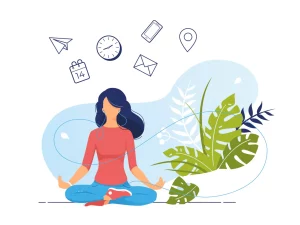You Build Clarity With Each Revisit
Jessica White July 30, 2025
In our fast-paced world, clarity often feels elusive. We’re constantly faced with decisions, changes, and challenges, which can lead to confusion or a lack of direction. However, you build clarity with each revisit. One of the most effective ways to achieve clarity—whether in your personal life, work, or creative pursuits—is to revisit your thoughts, decisions, and actions. The act of revisiting is not about dwelling in the past but using reflection as a tool for growth and decision-making.
When we revisit our thoughts, ideas, and decisions, we build clarity over time. This revisiting process allows us to reflect on our experiences, understand them in a deeper way, and make better choices in the future. Whether through journaling, project reviews, or simply taking time to reflect on our day, this process of review and reassessment can significantly enhance both personal and professional clarity.

How Repetition and Reflection Foster Clarity
The concept of revisiting is rooted in the idea that clarity and understanding are built over time, through reflection and repeated engagement. This is not a passive process but one that actively involves engaging with your thoughts and experiences.
1. The Role of Reflection in Cognitive Growth
Cognitive psychology suggests that repeated reflection on a subject helps to strengthen neural connections, deepening understanding. When we revisit an idea or decision, we’re essentially reinforcing and clarifying our mental models. This ongoing engagement leads to better insights and clearer thinking.
- Example: When learning a new skill or concept, revisiting it multiple times through practice and review leads to a deeper understanding and better performance over time. This process is known as the “spaced repetition” effect, which is widely used in educational settings to improve memory retention.
This principle also applies to decision-making. The more we reflect on past decisions, the clearer our thinking becomes, leading to better future decisions.
2. Decision-Making: The Impact of Reflection
When making decisions, especially important ones, it’s easy to fall prey to biases or emotions that cloud our judgment. Revisiting past decisions allows us to step back, reconsider our choices, and gain clarity on what really matters.
- Example: In business, leaders often conduct post-mortems after projects or decisions. This process helps teams identify what worked, what didn’t, and what can be improved in the future. This continuous process of revisiting past decisions helps build clarity and prevents repeated mistakes.
Moreover, reflecting on past decisions and their outcomes can also help us spot patterns in our thinking, enabling us to make more informed choices moving forward. In essence, clarity isn’t a one-time achievement but a continuous process that evolves with each revisit.
The Benefits of Revisiting and Reassessing
So, why should we make revisiting a regular part of our lives? Let’s look at some of the key benefits:
1. Increased Self-Awareness
By revisiting our thoughts and decisions, we gain a clearer understanding of ourselves. We begin to identify patterns in our behavior, our decision-making processes, and our emotional responses. This self-awareness is crucial for personal growth and effective problem-solving.
- Example: In mindfulness practices, people often revisit their feelings or experiences throughout the day to gain awareness of their emotional state. This awareness is the first step toward emotional regulation and self-improvement.
2. Enhanced Decision-Making and Problem-Solving
Clarity improves our ability to make decisions and solve problems. When we revisit past decisions, we gain insights that allow us to approach future challenges with more confidence and a clearer perspective. This is particularly important in complex decision-making scenarios where there are multiple variables at play.
- Example: A business strategist may revisit previous market analysis reports and customer feedback to refine their strategies. This continuous process allows for a more data-driven approach and ultimately improves decision-making.
3. Mental and Emotional Well-being
Revisiting can also have significant benefits for mental and emotional well-being. By reflecting on our experiences, we process our emotions and reduce stress. This process of reflection allows us to make sense of difficult situations, release pent-up emotions, and move forward with greater clarity.
- Example: Journaling, where you revisit your day or emotions, is a common practice used to reduce stress. Reflecting on difficult events or decisions in writing can help clear the mind and promote emotional healing.
Implementing the Practice of Revisiting for Clarity
Now that we’ve established the importance of revisiting for clarity and personal growth, how can we effectively implement this practice into our daily routines?
1. Make Reflection a Regular Habit
The key to building clarity through revisiting is consistency. Set aside time regularly to reflect on your thoughts, actions, and decisions. Whether it’s through journaling, meditation, or simply setting aside time at the end of each day, regular reflection helps you process experiences and gain new insights.
- Action Tip: Set a daily or weekly time slot to revisit your goals, past decisions, and any challenges you’re facing. Write down your thoughts, analyze your progress, and think about how you can improve in the future.
2. Use Structured Approaches to Revisiting
While free-form reflection can be valuable, structured approaches can help you revisit your thoughts more effectively. Use tools like mind maps, decision matrices, or SWOT (Strengths, Weaknesses, Opportunities, Threats) analysis to evaluate past decisions or projects.
- Example: After completing a work project, use a post-mortem analysis to review what went well and what didn’t. Break down the project into smaller components and evaluate each one, noting areas for improvement.
3. Embrace Feedback Loops
Feedback from others can be an essential part of the revisiting process. When we review decisions on our own, we may overlook certain details or biases. Bringing in external feedback—whether from colleagues, friends, or mentors—can provide a fresh perspective and lead to greater clarity.
- Action Tip: After reflecting on your own, seek feedback from trusted peers. Their input can reveal blind spots you might not have noticed and help you gain a more balanced perspective.
4. Revisit Your Goals and Values
Regularly revisiting your goals and values is essential for ensuring that you remain aligned with your long-term vision. By checking in with yourself and your aspirations, you can adjust your course and make sure you’re on track.
- Action Tip: Every few months, revisit your personal and professional goals. Are they still aligned with your values? Have your priorities shifted? Use this time to re-evaluate and set new intentions if needed.
The Role of Technology in Facilitating Revisits
Technology can play a crucial role in helping you revisit your decisions and actions. Tools like note-taking apps, project management platforms, and journaling apps can support the process of reflection by providing an organized way to track your progress, document your thoughts, and evaluate outcomes.
- Example: Platforms like Notion or Evernote allow you to create digital archives of your thoughts, notes, and project updates. These tools make it easy to revisit past ideas and decisions, helping you track changes over time.
Conclusion
In the quest for personal growth and professional success, clarity is a priceless asset. But clarity doesn’t appear overnight—it’s something that must be nurtured through ongoing reflection and reassessment. By embracing the practice of revisiting, you create space for greater self-awareness, enhanced decision-making, and personal evolution.
Whether you’re revisiting your past decisions, reflecting on your emotional well-being, or refining your goals, remember that clarity is built with each revisit. The more consistently you engage in this practice, the clearer your path will become.
So, take time to reflect today—your future self will thank you.
Reference
- The Cognitive Science Behind Revisiting & Spaced Repetition, https://en.wikipedia.org
- Reflective Practice & Journaling for Clarity, https://www.researchgate.net/publication
- Reflective Journaling & Mental Health, https://bmcmededuc.biomedcentral.com







